Sofia Coppola's Marie-Antoinette, a serious study of absurdity
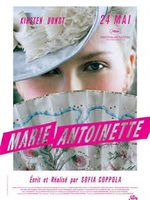 "This is ridiculous."
"This is ridiculous." -Marie-Antoinette (Kirsten Dunst)
"This, madame, is Versailles."
-La Comptesse de Noailles (Judy Davis)
In this exchange between Davis' comptesse and Dunst's young dauphine, the absurdity of their situation is confronted head on. Yes, it is ridiculous to watch an army of servants bow down to watch a girl rise from slumber. But it's great fun to watch on film.
Sofia Coppola's biopic of the doomed French queen is a breath of fresh air. It takes itself seriously in all the right ways, but has a great sense of humor about its subject. I love films that take a bygone era and expoit its lavish excesses for contemporary entertainment (it is of course far more pleasant to watch films about this era than it was to live it firsthand), but this film goes a step further: it comes clean about its own inability to represent the times, and thus comes as close as it can to succeeding. In Sofia Coppola's kind of period film, not everyone speaks with British accents, only the architecture (not the music) is Baroque, and people are allowed to look silly. Often.
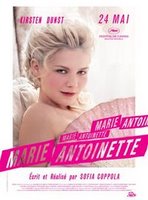 Coppola even encourages the silliness... but gently at first, easing us into the film's clash of styles. The title of the first song, "Natural's Not In It," might tip off some viewers to the director's unique sensibility. "This is 'Gang of Four,'" she posits (over the credits). "This is 17th century France," a moment later. "And this is 17th century France to 'Gang of Four'," finally. Watch the cinematic sparks fly.
Coppola even encourages the silliness... but gently at first, easing us into the film's clash of styles. The title of the first song, "Natural's Not In It," might tip off some viewers to the director's unique sensibility. "This is 'Gang of Four,'" she posits (over the credits). "This is 17th century France," a moment later. "And this is 17th century France to 'Gang of Four'," finally. Watch the cinematic sparks fly. It saddens me that so many seem unable to see past the surface-level strangeness of the approach to the cinematic poetry within. This was as engrossed I'd ever been in a period film. Yes, traditional direction works much of the time (Shakespeare in Love, Elizabeth, Queen Margot) but often proves stultifying, too (Maurice, Finding Neverland). And sometimes, attempts at adhering to preconceived norms result in lots of unintentional silliness (Memoirs of a Geisha). In any case, even "traditional" period films generally succeed due to some degree of edginess, and knowing this, Coppola doesn't bother holding back. She goes all-out for emotional truth, and her film is all the richer for it.
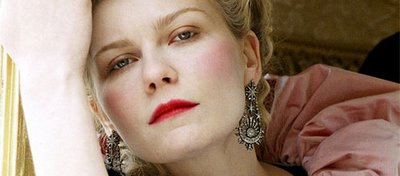
Many had reservations about the casting of Dunst as Marie (and even I had reservations about Schwartzman as Louis XVI), but they both prove quite right for their parts. Dunst, I think, is a solid actress, and has just the right vibe for this role. Her screen persona exudes a paradoxical pairing of girlishness and womanhood, silliness and mystery. Here, she clicks instantly as the porcelain-doll dauphine, a strange blend of regality and cluelessness. Her delicate features fit in perfectly with the period, while at the same time feeling contemporary (Dunst seems quite at home in any time period, from Baroque to Roaring Twenties to Now, and is also quite beautiful, despite the haters; more on Kirsten's virtues here). And Schwartzman's "lost and befuddled" quality works for his character as well.
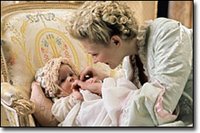 Dunst's Marie is the audience's entry point into the film. Through her naive, 80s-music-addled psyche, we see various family members, authority figures, distant husbands, and catty court royals, as she attempts to maneuver through a system she doesn't understand, and is powerless to control. We follow Marie through various travails including marital woes, trouble with conception, motherhood, a torrid affair, and eventually, the storming of her palace by an angry mob. Along the way, we're treated to sumptuous sets and costumes, gorgeous cinematography, and perfectly calibrated 80's music. Lance Accord silences any critics of his "fuzzy" lensing of Coppola's Lost in Translation; his work here is crisp and beautiful. And the soundtrack is a delight; it gets us into the head of Marie-Antoinette far better than any stuffy score could. In fact, I don't recall much instrumental score anywhere (though there's usually plenty of it in films like this), but it's not missed. "New Order" and "The Strokes" are just fine.
Dunst's Marie is the audience's entry point into the film. Through her naive, 80s-music-addled psyche, we see various family members, authority figures, distant husbands, and catty court royals, as she attempts to maneuver through a system she doesn't understand, and is powerless to control. We follow Marie through various travails including marital woes, trouble with conception, motherhood, a torrid affair, and eventually, the storming of her palace by an angry mob. Along the way, we're treated to sumptuous sets and costumes, gorgeous cinematography, and perfectly calibrated 80's music. Lance Accord silences any critics of his "fuzzy" lensing of Coppola's Lost in Translation; his work here is crisp and beautiful. And the soundtrack is a delight; it gets us into the head of Marie-Antoinette far better than any stuffy score could. In fact, I don't recall much instrumental score anywhere (though there's usually plenty of it in films like this), but it's not missed. "New Order" and "The Strokes" are just fine.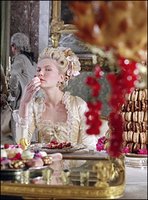 The decision to end the film before Marie-Antoinette's execution could be seen as a copout, but since it didn't begin with her birth either, the omission is perfectly defensible. This is a slice-of-life biopic (my favorite kind!), not a trip from womb to tomb. We certainly get the impression by the end that no happy times lie ahead. That everyone knows what is ahead for Marie does not necessitate that we all see it.
The decision to end the film before Marie-Antoinette's execution could be seen as a copout, but since it didn't begin with her birth either, the omission is perfectly defensible. This is a slice-of-life biopic (my favorite kind!), not a trip from womb to tomb. We certainly get the impression by the end that no happy times lie ahead. That everyone knows what is ahead for Marie does not necessitate that we all see it.Some slight pacing issues aside, Marie-Antoinette is impeccably made, deliciously sending up the reverie of the French court, while taking taking the plight of its queen quite seriously. If it comes off as shallow at times, if we feel that we never fully come to know the characters, that is intentional, for they never get to know themselves. We see Marie's life as she herself did. One wonders what might've become of Marie if she'd had the freedom to pursue her own interests, her own loves... to marry the man she wanted... to even discover what she wanted... to have the chance to be something other than a teenage queen. If so, the story of her life might have been more satisfying. As is, however, it's a fascinating study of the absurdity and aloofness of royal life.
Many a critic has dismissed the film as visually appealing fluff, balked at Coppola's merging of contemporary pop and period finery. But in their dismissal, they confuse shallow filmmaking with the portrayal of a shallow world. This film knows what it's doing and does it extremely well. It makes art out of life's absurdity.
 "This is ridiculous," the critics claim.
"This is ridiculous," the critics claim."This," says Sofia, "is film."
Show 'em how it's done, Sofia.
Verdict: "Criminally underrated."



5 Comments:
ugh...
i just have no (that's ZERO) interest in seeing this film!
--RC of strangeculture.blogspot.com
Well, if you have no interest because you aren't into the subject matter or the talent involved, or just don't expect to like it for whatever reasons, then fair enough. Just don't be scared away by bad reviews. A lot of critics just aren't getting it.
It has tons to offer for those who are inclined.
I absolutely all the ppl involved on this film and that's reason enough for me to want to see it. I admit I got a bit scared when it got so many bad reviews on Cannes and later on the USA. But later I realized it was the kind of fun I also love: great style over substance.
I loved your review because ir reassured me that. I can't wait for it to open here in Brasil.
Well I would say the style serves the substance... but yes, it's very stylish.
I really really enjoyed it.
carson83.blogspot.com is very informative. The article is very professionally written. I enjoy reading carson83.blogspot.com every day.
online payday loan
faxless payday loans
Post a Comment
<< Home